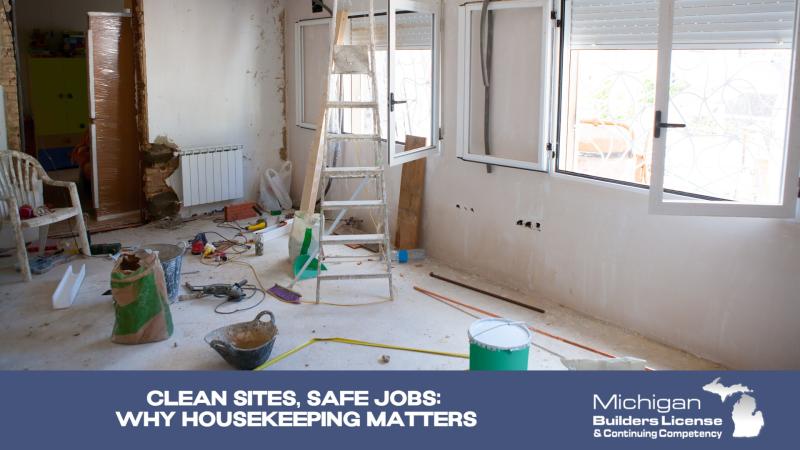Maintaining a clean and organized construction site is not only a hallmark of professionalism but also a critical component of safety and regulatory compliance, especially for builders in Michigan. Adhering to the Michigan Occupational Safety and Health Administration (MIOSHA) standards ensures worker safety and project efficiency. Whether you're a seasoned professional or new to the industry, integrating robust housekeeping practices into your daily operations can lead to significant benefits in safety, productivity, and client satisfaction.
The Impact of Poor Housekeeping on Construction Sites
Inadequate housekeeping on construction sites can lead to severe consequences:
- Injury Rates: Falls, slips, and trips are among the leading causes of injuries in the construction industry. In 2021, nearly 1 in 5 workplace deaths occurred in the construction sector, with over one-third resulting from falls, slips, and trips.
- Fatalities: The construction industry accounted for 46.2% of all fatal falls, slips, and trips in 2021, underscoring the critical need for effective housekeeping and safety measures.
- Economic Costs: While specific figures for 2023 are not available, investing in safety programs has been shown to yield significant returns. According to the National Safety Council, for every dollar invested in injury prevention, businesses can see a return of $2 or more.
MIOSHA Housekeeping Regulations
Compliance with MIOSHA standards is essential for Michigan builders. Specific regulations related to housekeeping include:
- Material Storage and Disposal: Materials, including scrap and debris, must be piled, stacked, or placed in containers in a manner that does not create hazards to employees.
- Work Area Maintenance: Work areas should be kept reasonably clean and free of debris to minimize slip and trip hazards. Hazardous leaks or spills must be promptly cleaned to prevent slipping and fire hazards.
- Floor Conditions: Floors must be maintained free of water, oil, grease, paint, or other substances that could cause slipping, tripping, or falling hazards.
LII / Legal Information Institute
Practical Tips for Better Job Site Housekeeping
- Maintain Clear Walkways and Ladders
- Ensure aisles, stairs, and pathways are free of loose objects, debris, or slippery substances.
- Address hazards immediately, such as cleaning up spills or relocating materials.
- Organize and Secure Materials
- Stack materials like bricks, pipes, and steel rods carefully to prevent collapses.
- Use racks or supports for rods, pipes, and other elongated materials.
- Avoid overloading floors, platforms, or scaffolds with excessive weight.
- Prioritize Proper Disposal
- Schedule regular cleanups to remove scrap materials, boxes, and other trash.
- Implement daily or even hourly cleanups to maintain a safe and manageable site.
- Leverage Good Lighting
- Ensure work areas are well-lit to reduce the risk of accidents.
- Report and replace any burnt-out bulbs or malfunctioning fixtures promptly.
- Educate and Empower Workers
- Encourage team members to adopt a proactive attitude toward housekeeping.
- Empower workers to address or report hazards without hesitation.
Long-Term Benefits of Consistent Housekeeping
Implementing and maintaining effective housekeeping practices offers numerous long-term benefits:
- Enhanced Safety: A clutter-free environment reduces the risk of accidents and injuries.
- Improved Efficiency: Organized sites enable workers to locate tools and materials quickly, boosting productivity.
- Cost Savings: Reducing accidents lowers the potential for costly downtime and workers' compensation claims.
- Regulatory Compliance: Adhering to MIOSHA standards helps avoid fines and ensures smooth project progression.
Final Thoughts
For Michigan builders, maintaining a clean job site is not merely a best practice but a critical step toward complying with MIOSHA standards, ensuring worker safety, and safeguarding profitability. Incorporating these housekeeping habits into daily workflows will yield significant benefits in safety, productivity, and customer trust.
At Michigan Builders License, we offer courses designed to help builders enhance their skills, comply with regulations, and maintain safe job sites. Enroll in our Continuing Competency or 60-hour Pre-licensing course today to build a safer and more successful future for your projects.


